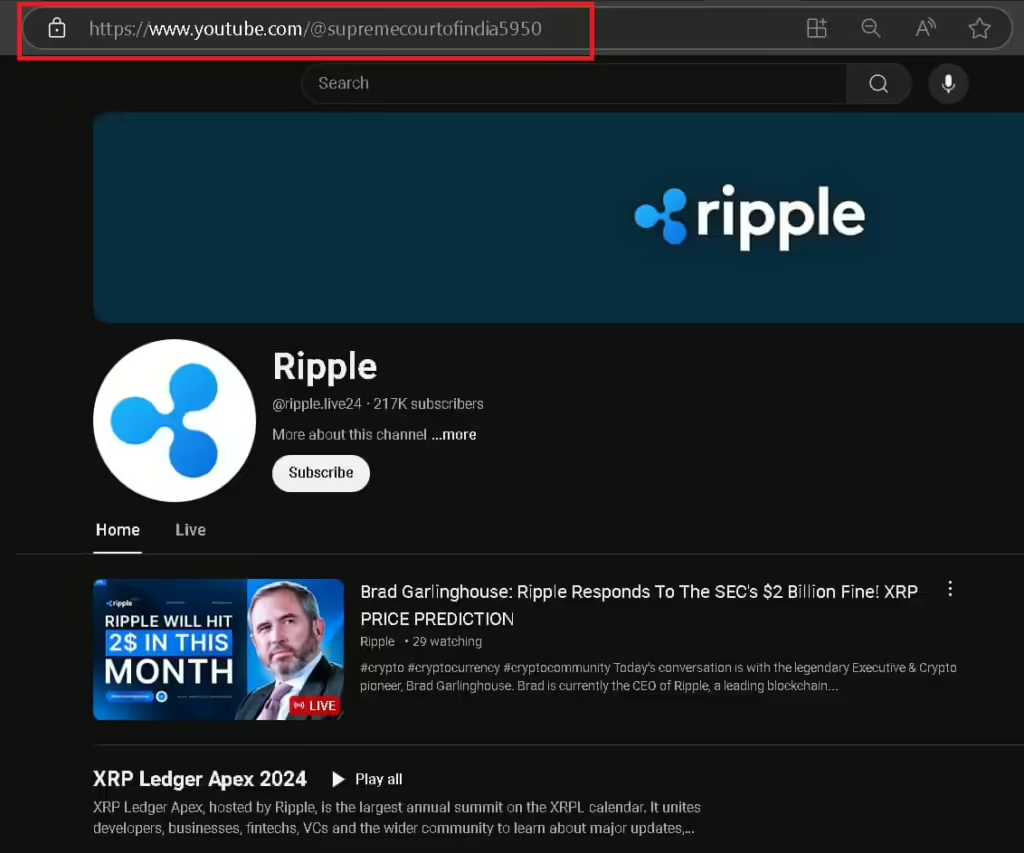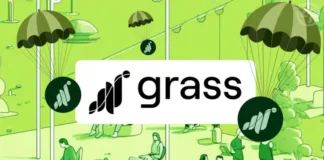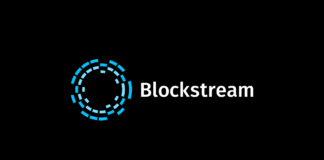In a concerning incident that underscores the ongoing vulnerability of online platforms to hacking, the official YouTube channel of the Supreme Court of India was recently hijacked by cryptocurrency scammers. The hackers seized control of the high-profile channel to promote a fraudulent investment scheme involving the digital asset XRP, formerly known as Ripple. This brazen attack not only compromised the court’s digital presence but also highlighted the persistent threat of crypto-related fraud targeting unsuspecting victims, similar to the notorious Elon Musk crypto scam and other YouTube crypto scams.
Anatomy of the Hack: Rebranding and Impersonation
On September 20th, the Supreme Court of India’s YouTube channel, boasting over 217,000 followers, was the target of a sophisticated hacking operation. The perpetrators swiftly rebranded the channel to resemble Ripple, the company behind the XRP cryptocurrency, and proceeded to delete all previously uploaded content. This strategic move was designed to lend an air of legitimacy to the impending scam, much like the Elon Musk impersonation tactics used in other cryptocurrency fraud schemes.
Read More: BlackRock Bitcoin ETF Gets SEC Approval for Nasdaq Options Listing
Fake Livestream and Fraudulent Promises
The hackers then used the hijacked channel to broadcast a live stream featuring Ripple CEO Brad Garlinghouse. This livestream, akin to the deceptive Elon Musk deepfake videos used in other scam detection, purported to offer lucrative XRP investment opportunities, making unrealistic promises of substantial returns. The goal was to lure unsuspecting viewers into a Ponzi scheme, where they would be encouraged to connect their cryptocurrency wallets like Bitcoin, Ethereum or Dogecoin and ultimately lose their funds to fraudulent domains and fake trading bots promising guaranteed daily gains.

YouTube’s Prompt Response and Takedown
Recognizing the severity of the situation, YouTube acted swiftly to address the breach. On the same day the channel was compromised, the streaming platform took down the hijacked account, denying the scammers further access and preventing the dissemination of their fraudulent content. This highlights the importance of automated reporting tools and verified accounts in combating scam websites and pump-and-dump schemes on the platform.
Supreme Court’s Public Notice and Recovery Efforts
Concurrently, the Supreme Court of India issued a public notice informing the public about the incident and the subsequent removal of the channel. This proactive step demonstrated the court’s commitment to transparency and its desire to protect the public from potential financial harm, much like the warnings issued about the Michael Saylor scam, Tesla crypto scam, and Berkshire Hathaway scam.
Partial Recovery of the Channel
In a follow-up update, the Indian Supreme Court announced that its YouTube account had been successfully recovered from the XRP hackers. However, further investigation revealed that the channel’s original subscriber base of over 217,000 followers and its previous video uploads could not be fully restored. The recovered account was renamed to ‘Vansh’ and had only 15 subscribers, a far cry from its pre-hack status, underscoring the lasting damage of social media hacking.
Read More: Can Supra Oracle Achieve 500K TPS? Examining the Technical Specs
Lingering Challenges and Implications
The inability to fully restore the Supreme Court’s YouTube channel highlights the persistent challenges faced by online platforms in the aftermath of such breaches. The loss of the channel’s subscriber base and content archive underscores the long-term impact of these attacks, which can extend beyond the initial incident, similar to the fallout from the Elon Musk bitcoin giveaway scam and other celebrity impersonation schemes.
Broader Trend of Crypto-Related Scams on YouTube
The hijacking of the Supreme Court’s YouTube channel is not an isolated incident. In fact, it is part of a broader trend of cryptocurrency-related scams proliferating on the video-sharing platform. During the launch of Apple’s iPhone 16 in September, YouTube was flooded with deepfakes and sponsored videos featuring a fraudulent Tim Cook, shilling crypto scams to unsuspecting viewers, much like the Mr Beast crypto code and Elon Musk AI scam.
YouTube’s Efforts to Mitigate Crypto Scams
YouTube’s support team has acknowledged the prevalence of these scams and has taken steps to address the issue. In a September 9th post on X (formerly Twitter), the platform urged users to report any suspicious crypto-related content through the official reporting tool. This collaborative approach between the platform and its user community is crucial in combating the ongoing threat of financial fraud on YouTube, including scams like Biticodes fraud, Moneytoken scam, Lymenex scam, Beast tasks scam, Moontenx scam, Uwerx scam, Bitreels fraude, and Bayex.io scam.
Conclusion
The Supreme Court of India’s experience with the YouTube channel hijacking serves as a cautionary tale for organizations and individuals operating in the digital realm. As the adoption of cryptocurrencies and the prevalence of related scams continue to rise, the need for robust cybersecurity measures like hardware wallets, OCR detection, Google Vision API, view bots monitoring, and wallet blacklisting, along with heightened public awareness about cognitive bias exploitation, has never been more pressing.
Disclaimer: The information provided in this article is for informational purposes only and does not constitute financial advice. Investing in cryptocurrencies involves risks, and readers should conduct their own research and consult with financial advisors before making investment decisions. Hash Herald is not responsible for any profits or losses in the process.













